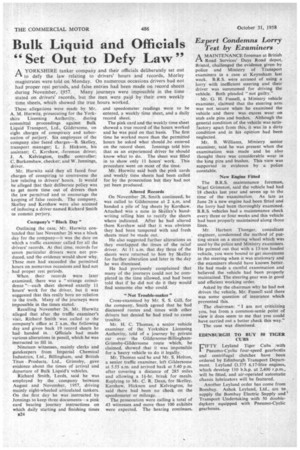Bulk Liquid and Officials "Set Out to Defy Law "
Page 28

If you've noticed an error in this article please click here to report it so we can fix it.
A YORKSHIRE tanker company and their officials deliberately set out " to defy the law relating to drivers' hours and records, Morley magistrates were told on Monday. On numerous occasions drivers had not had proper rest periods, and false entries had been made on record sheets
during November, 1957. Many journeys were impossible in the time stated on drivers' records, but the men were paid by their own weekly time sheets, which showed the true hours worked.
These allegations Were made by Mr. A. M. Hurwitz, prosecuting for the Yorkshire Licensing Authority, during committal proceedings against Bulk Liquid Transport, Ltd„ Gildersome, on eight charges of conspiracy and subornation of perjury. Six employees of the company also faced charges—B. Skelley, transport manager; L. J. Hickson, his assistant; C. Kershaw, -foreman driver; J. A. Kelvington, traffic controller; C. Burkenshaw, checker; and W. Jennings, driver.
Mr. Hurwitz said they all faced four charges of conspiring to contravene the law relating to drivers' hours. It would be alleged that their deliberate policy was to get more time out of drivers than the law permitted and to encourage the keeping of false records. The company, Skelley and Kershaw were also accused of inducing a driver named Richard Smith to commit perjury.
Company's "Black Day"
Outlining the case, Mr. Hurwitz contended that last November 26 was a black day for the company—it was the date on which a traffic examiner called for all the drivers' records. At that time, records for seven particular drivers were not produced, and the evidence would show why. These men had exceeded the permitted hours on numerous occasions and had not had proper rest periods.
When their records were later examined, there was a "strange coincidence "—each sheet showed exactly 11 hours' work for the driver, but it was suggested that this really bore no relation to the truth. Many of the journeys were impossible in the times stated.
Recalling November 26, Mr. Hurwitz alleged that after the traffic examiner's visit, Richard Smith was called to the company's office at 2 a.m. the following day and given back 19 record sheets he had handed in. Officials had made various alterations in pencil, which he was instructed to fill in.
Nineteen witnesses, mainly clerks and gatekeepers from Imperial Chemical Industries, Ltd., Billingham, and British Titan Products, Ltd., Grimsby, gave evidence about the times of arrival and departure of Bulk Liquid's vehicles.
Richard Smith, Leeds, said he was employed by the company between August and November, 1957, driving mainly eight-wheeled articulated tankers. On the first day he was instructed by Jennings to keep three documents—a pink card bearing journey instructions on which daily starting and finishing times B24 and speedometer readings were to be entered, a weekly time sheet, and a daily record sheet.
The pink card and the weekly time sheet showed a true record of the hours worked and he was paid on that basis. The first time he worked more than the permitted hours he asked what should .be entered on the record sheet. Jennings told him that as an experienced driver he should know what to do. The sheet was filled in to show only 11 hours' work. This procedure went on most of the time.
Mr. Hurwitz said both the pink cards and weekly time sheets had been called for by the prosecution but they had not yet been produced.
Altered Records
On November 28, Smith continued, he was called to Gildersome at 2 a.m. and handed a pile of log sheets by Kershaw. Attached was a note in Skilley's handwriting telling him to rectify the sheets where indicated. After he had altered them Kershaw said that it was obvious they had been tampered with and fresh sheets must be made out.
He also suggested further alterations as they overlapped the times of the relief driver. At ll a.m. that day three of the sheets were returned to him by Skelley for further alteration and later in the day he was dismissed.
He had previously complained that many of the journeys could. not be completed in the time allowed, and had been told that if be did not do it they would find someone else who could.
"Not Trouble-maker" Cross-examined by Mr. S. S. Gill, for the company, Smith agreed that he had discussed routes and times with other drivers but denied he had tried to cause trouble.
Mr. H. C. Thomas, a senior vehicle examiner of the Yorkshire Licensing Authority, told of a journey by private car over the Gildersome-BillinghamGrimsby-Gildersome route which, he . claimed, showed that it was impossible for a heavy vehicle to do it legally.
Mr. Thomas said he and Mr. S. Holton, a senior traffic examiner, left Gildersome at 5.55 a.m. and arrived back at 5.40 p.m. after covering a distance of 285 miles and allowing a 11-hr, break for meals. Replying to Mr. C. R. Dean, for Skelley, Kershaw, Hickson and Kelvington, he said there had been no check on the speedometer or mileage.
The prosecution were calling a total of 43 witnesses and more than 100 exhibits were expected. The hearing continues.
































































































